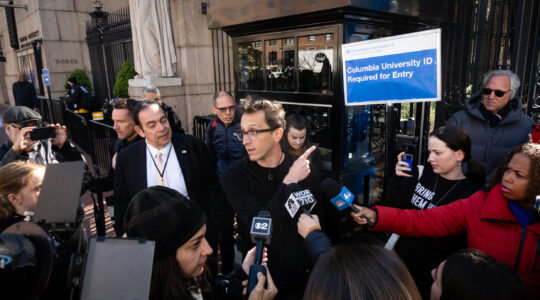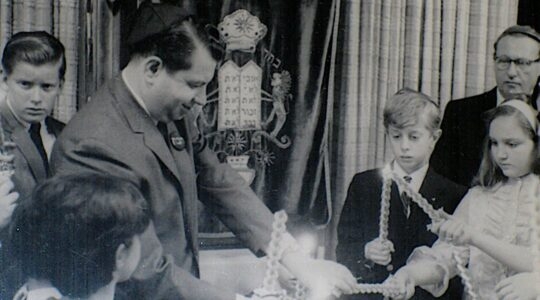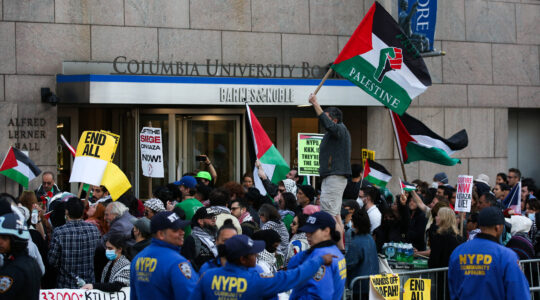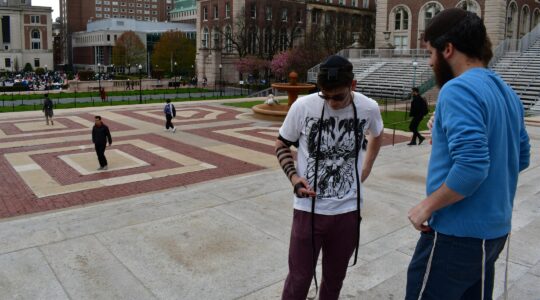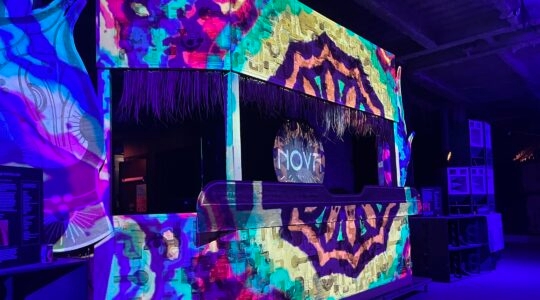Two sights — and two sites — stuck in Holocaust survivor Sol Rosenkranz’s memory after he returned to his hometown in central Poland a few months following his liberation from Terezin.
The town square. It was paved with Jewish gravestones.
And the Jewish cemetery. “It was an empty field,” said Rosenkranz, 96, a retired interior decorator who came to the United States in 1946 and lives on the Upper West Side. The gravestones were removed by German soldiers during World War II, some to the town square of Krosniewice, some to parts unknown.
Rosenkranz, who survived six concentration camps and lost seven members of his immediate family in the Shoah, spent several days in his hometown in August 1945, looking for remnants of the Jewish community, recovering some valuables he had buried in the backyard of his family’s home, and lobbying for the restoration of the Jewish cemetery. He took his concerns about the desecrated burial grounds to the town’s mayor, who promised to return the gravestones to their proper place and renovate the area.
Then Rosenkranz left Krosniewice.
Of 2,000 Jews who had lived there before the war, in a community that dated to the mid-18th century, none were left; an early 1942 deportation had taken away the hundreds that had remained in the ghetto. Rosenkranz spent the next year recuperating, getting assistance from the Joint Distribution Committee, reuniting in a displaced person’s camp in Czechoslovakia with an older brother who had survived the war.
Then he met the woman, a fellow survivor, who would become his wife for 50 years, until her death of a heart attack in 1996.
Then he left Europe, thinking he would never return.
The cemetery in Krosniewice (Kroshnivitz in Yiddish) stayed on his mind. Many members of his family were buried there. “Grandparents. Uncles. All kinds of mishpoche.”
But he couldn’t do anything about it.
Work and family and volunteer work (at the Simon Wies enthal Center in Los Angeles, where he and his wife, Sally, lived for two decades; and at the Museum of Jewish Heritage – A Living Memorial to the Holocaust here) filled his time. Contact with officials in communist Poland about the status of the cemetery was out of the question.
Communism in Poland fell in 1989. Rosenkranz went back there, accompanied by members of his American family, about a decade later; three more times in the last 10 years — the last time, this summer. It was for the dedication of a concrete fence around the grounds that he financed, with a memorial plaque in three languages near the entrance.
Support the New York Jewish Week
Our nonprofit newsroom depends on readers like you. Make a donation now to support independent Jewish journalism in New York.
The renovations cost Rosenkranz — not a wealthy man — “a lot of money,” he said, offering no exact figures. “The accomplishment overweighed money in the bank. The money in the bank wouldn’t make me as happy as this.”
On his first return trip to his hometown, which is west of Warsaw and north of Lodz, he found the condition of the cemetery unchanged from 1945. “Nothing happened.” The town square was paved over — no sign of the gravestones. The 1945 mayor hadn’t kept his promise.
The post-Communism mayor gave Rosenkranz permission to take charge of the still weedy, unkempt, tick-infested field where only a few fragments of gravestones remained. The municipality, which owned the 3.5-acre field, didn’t have the funds for restoration.
With the help of Michael Schudrich, Poland’s Long Island-born chief rabbi, and of the Foundation for the Preservation of Jewish Heritage in Poland, Rosenkranz arranged for the wall to be built around the cemetery, which borders on a cornfield. He went back there in subsequent years to make sure the job was being done right, his responsibility as a survivor.
“What I have learned from experience is the value of being kind to others and never to lose hope,” Rosenkranz said in a 1999 High Holy Days speech at Congregation B’nai Jeshurun that is included in a small, self-published autobiography.
His life is a series of close calls, miraculous escapes, bravado and street smarts.
Four years short of the century mark, an active member of Congregation Ohav Shalom, he appears to be 20 years younger, his hearing and eyesight intact. “I have to thank God for this. I was lucky from day one,” he said.
“Sol is one of the youngest people I have ever met — young in the sense of vibrancy, of being alive, of being forward thinking,” Rabbi Schudrich said. “What Sol has done is an example of what other people can do.”
The rabbi has acted as an intermediary for similar renovations of a dozen or two Jewish cemeteries in small towns in Poland, usually at the instigation of a survivor from that venue. “Nobody of his age,” Rabbi Schudrich said of Rosenkranz.
One of seven children in “a religious … not very religious” family, Rosenkranz was 21 when the Nazis came to his town in September 1939. His father was a tanner; Rosenkranz worked in the family business, hoping to become a furrier. In quick order after the Nazis’ arrival came beatings, shootings, robberies, a ghetto, the Yellow Star, forced labor and deportations to death camps. His father was arrested that year. Rosenkranz never saw his father again, has no idea of his fate. “Ad hayom” — until today. A brother and a sister went to their death in Nazi camps, voluntarily taking the place, “out of respect,” of older siblings who had received deportation orders.
For two years Rosenkranz hid by himself in a small, empty, unheated kiosk near his family’s home. He was caught and put to work for Nazi officers; he helped six members of his family escape one night, on the eve of the imminent liquidation of the Krosniewice (krosh –nye-VI-tse) ghetto. They found refuge in the homes of goodhearted, non-Jewish Poles several miles away — who did not ask for payment. Eventually, four members of that group perished at Treblinka; only Rosenkranz and his brother, both working at forced labor, emerged from the war with their lives.
His legacy to his family, and to the other Jews of Krosniewice, are the cemetery renovations for which he is paying. Next, maintenance of the grounds, and construction of a path from the main road. He plans to go back to monitor those improvements.
Support the New York Jewish Week
Our nonprofit newsroom depends on readers like you. Make a donation now to support independent Jewish journalism in New York.
It’s his duty, Rosenkranz said. “I am the last living Jew of my city.”
